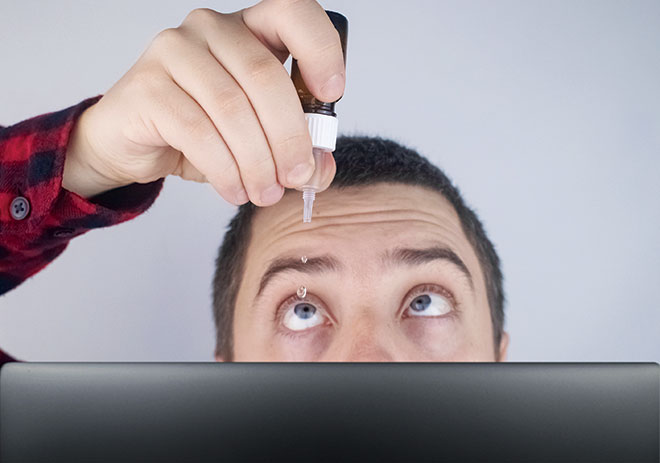Are you frequently bothered by a stinging, burning or scratchy sensation in your eyes? Do you notice your eyes are sensitive to light and find, when checking in the mirror, that they are red? Perhaps you’ve noticed these symptoms particularly while driving at night or after prolonged periods of reading or computer work. You might be suffering from dry eyes.
Normally, our body keeps our eyes moist by producing tears and washing them over the eye by blinking. Most people blink 15 to 20 times per minute.
Dry eyes occur most often when we don’t produce adequate tears. While everyone’s eyes dry out at times, as many as one in 20 Americans suffer with chronic dry eyes. The problem is more common in women and people over 50. Certain medical conditions cause dry eyes, such as thyroid disorders, Vitamin A deficiency and autoimmune diseases like lupus and rheumatoid arthritis.
Medications designed to dry us out can dry our eyes, too, such as decongestants and antihistamines, as well as certain blood pressure or acne medications. Direct damage to the eye, such as with contact lens use or eye surgery, also can be contributing factors. Even hormonal changes, including menopause and use of birth control pills, affect our tear production.
Sometimes there’s a problem with the blinking process. Issues with blinking include infection, scarring and some medical conditions.
Environment affects our eyes, too. Heating and air conditioning can cause drying — so can exposure to wind or visiting a low-humidity area. Smog, forest fires and cigarettes can irritate the eyes as well.
We can’t prevent aging, but we can take other preventative steps. A humidifier near the bedside moisturizes your eyes. Sunglasses help, especially those that wrap around to prevent wind damage.
To rest your eyes, take frequent 10-second shut-eye breaks while working on a computer or concentrating on a visual task. If you’re going to be on a long flight or performing an eye-challenging task, use artificial tears. Over-the-counter ones may be as simple as saline drops or as complicated as special ingredients designed to closely mimic tears. If you find you’re using these several times a day, it’s probably a good idea to see the eye doctor to get a proper diagnosis.
The ophthalmologist will perform a complete eye examination, sometimes followed by tests such as measuring your tear production and the quality of your tears. Gulfport-based ophthalmologist Dr. Chris Hogan recommends trying different brands of artificial tears and settling on one that seems most comfortable to you.
Once a person is diagnosed with dry eyes, he or she likely will have the problem for life. Continual use of artificial tears may be all that’s needed, but your eye doctor may have other recommendations, including warm compressions and anti-inflammatory eye drops.
Take care of your eyes. Keep them moist, wear protection and schedule checkups with your ophthalmologist.
Dr. Philip L. Levin is a retired emergency medicine specialist in Gulfport. Learn more or contact him at www.Doctors-Dreams.com.



